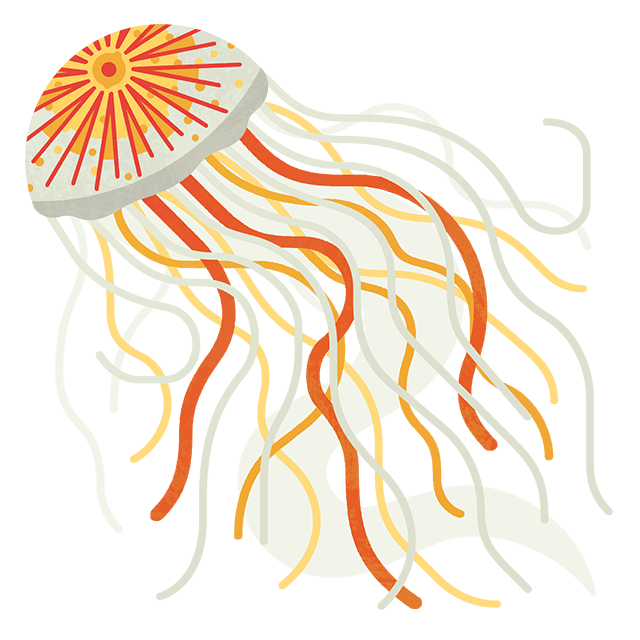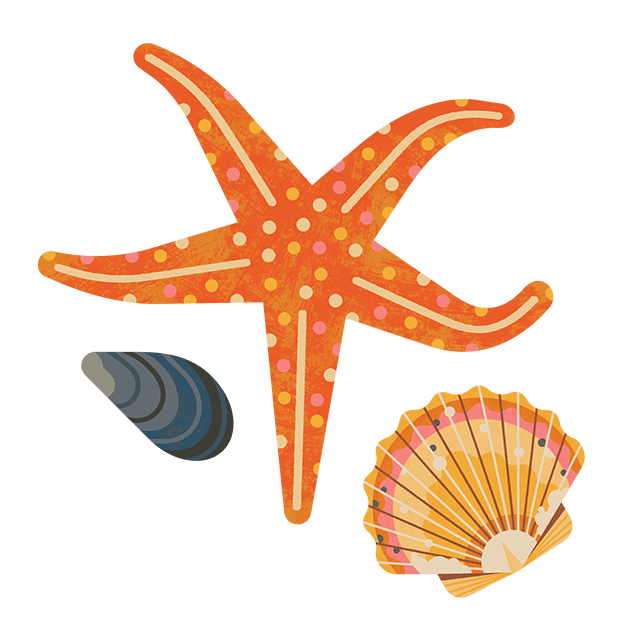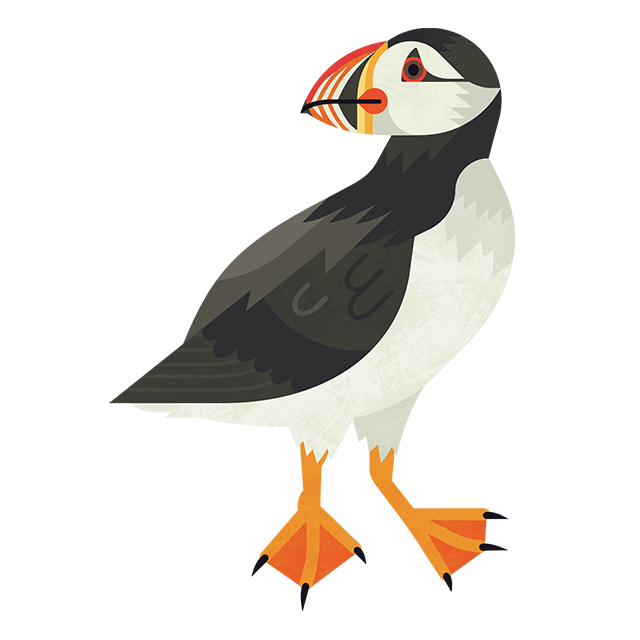
Our year in review: 2021
16 minute read
It's been another busy and challenging year for our ocean and all of you who support us to help protect it, so we thought we would raise our glasses to ocean optimism and celebrate some of our favourite stories and successes from 2021!
January
A call for better protection for offshore MPAs
After a year-long study, our Marine unProtected Areas report revealed that damaging fishing practices like bottom trawling are still taking place in a shocking 98% of the UK's Marine Protected Areas (MPAs), created to protect vital seabed habitats.
We took our report to Westminster and gained a commitment from Environment Minister, Rebecca Pow, to implement bye-laws to manage fishing activity in offshore MPAs with protected seabeds by 2024 – a key ask in our report and a huge win for our seas. We'll be holding UK governments to account with our Reality checker map.
5
years
after protection from bottom trawling, animals in 3 UK Marine Protected Areas were found to be larger and more diverse
21
%
average increase in biodiversity in fully protected marine areas
25
%
of our carbon emissions are captured and stored by the sea

Empty and broken scallop shells possibly due to the raking action of dredges
Credit: Colin Munro/Marine-bio-images
Deposit Return Scheme put on back burner
February
Many wet wipes still not 'Fine to Flush'
In February, we released the results of our survey which analysed how high street retailers are performing when it comes to testing, labelling and removing plastic from their own-brand wet wipes. We found that many brands were still falling short and too many wet wipes end up on UK beaches as a result of being wrongly flushed.
We've been pushing for the Fine to Flush standard to become mandatory and for UK governments to ban plastic wet wipes.

Credit: Natasha Ewins
Saving seagrass in the south of England
On World Seagrass Day, we turned our attention to this underrated ocean hero, which has suffered a huge decline over the past century. Our Sea Champion volunteers are determined to put that right and have been part of the ReMEDIES seagrass planting project to restore 8 ha of seagrass meadows in the Plymouth Sound and Solent Maritime Special Area of Conservation.
We've also been working with the yachting community to protect seagrass from boat moorings with the introduction of Voluntary No-Anchor Zones and Advanced Mooring Systems that use buoys to lift the chains off the seabed.
You can find out more about the wonders of seagrass in the video below.
March
Wally the Walrus arrives for summer holiday
Wally the Walrus captured the headlines and delighted the public when he was spotted off the coast of Ireland (where he sank several boats), before making his way over to Wales and heading south to Cornwall. It's thought the 800kg tusked creature fell asleep on a drifting iceberg in the Arctic Circle and woke up thousands of miles from home!
Beachwatch manager Lauren Eyles kept a keen eye on his progress and shared these fascinating facts. Follow us on Facebook, LinkedIn and Twitter for the latest marine wildlife news.

Wally the Walrus taking a relaxing break
Sustainability, seafood and Seaspiracy
The release of Netflix documentary Seaspiracy, about the environmental impact of fishing, proved both shocking and controversial.
There were some strong reactions from the public which we provided measured answers for, acknowledging that whilst people eat seafood we believe that it’s important to ensure that they are informed about the most sustainable options. You can read our full response here.
While the threats to our ocean are real, we believe that recovery can happen if we put pressure on governments and industry to fish more sustainably while encouraging consumers to make informed decisions.
April
Our Good Fish Guide
In April, we not only launched our new look and website, but also our new and improved Good Fish Guide. Thanks to our largest ever grant, we were able to totally transform our tool to make it even easier to choose sustainable seafood and support healthy, thriving seas.
Now you can add the Good Fish Guide to your phone for easy access to our sustainability ratings while you're out and about. Handy when you're out shopping!

Rare sea sponge finally named
In April, we ran a competition to name a unique purple sea sponge, discovered by Seasearch divers in the North Norfolk chalk beds. Expert judges unanimously agreed the sponge should be named Parpal Dumplin’ – a name that evokes the sounds of the Norfolk accent.
Children were invited to name the purple creature as part of our Agents of Change project, which aims to connect people with their local seas. The winning suggestion was submitted by 9-year-old Sylvie from Langham Village School. Sylvie said that she came up with the new name “because the sponge is purple and it looks like a dumpling”.

The Parpal Dumplin'
May
Fish INTEL project gets underway
May saw the start of Fish INTEL – a major EU-funded project to learn more about fish behaviour within UK, French and Belgian seas. Using innovative acoustic tracking devices, we hope to discover how key species use different ecosystems, which will help inform commercial fishing policies and allow marine life to thrive.
The Fish INTEL team has tagged 16 bass, 30-35 crawfish and 29 bluefin tuna – but it hasn't always been easy (bluefin tuna can weigh up to 200kg!). Keep up to date with developments on our Fish INTEL project page.
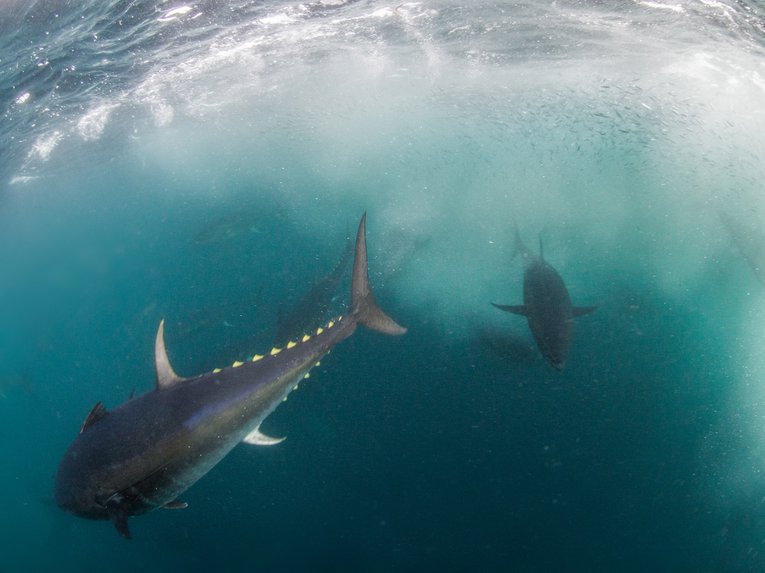
Bluefin tuna
Credit: Mark Kirkland
Scotland's Ocean Recovery Plan
Following the elections, we were pleased that our collective Ocean Recovery Plan for Scotland, launched in December and shared with potential candidates, helped influence an historic Scottish Government/Scottish Green agreement in August 2021 that committed to fully protect at least 10% of Scotland’s seas by 2026, four years ahead of international deadlines.
June
Trustee Seth Richardson takes part in epic challenge
Seth took part in one of the toughest multi-sport endurance races in the world. The Three Peaks Yacht Race is a non-stop gruelling event that involves sailing or rowing 389 miles through some of the UK's most difficult waters, running 54.8 miles, cycling 40 miles and climbing 16,500 vertical feet.
Seth and his team not only completed the challenge, they raised a fantastic £16,275 for the Marine Conservation Society. Great work Seth! Why not take up your own fundraising challenge in 2022?

Seth Richardson, Marine Conservation Society Trustee
July
Thousands join our Plastic Challenge
Campaigning for an end to plastic pollution
Plastic contaminating the ocean is expected to triple in the next 20 years. We must stop this pollution at source.
That’s why we created a briefing document which details the full extent of the single-use plastic problem, as well as some research-backed solutions that could make a real difference, to politicians, funders and our supporters.
We need everyone to join forces to help to cut back on the plastic choking our ocean.
You can read the full briefing document here.

Reusuable coffee cups are just one way to reduce your plastic footprint
Our call for urgent action on sewage sludge
Treated sewage sludge containing harmful chemicals and microplastics is being spread over UK farmland. We called urgent action to ensure the health of the environment, including marine ecosystems.
We created a helpful film to highlight the problem, and called for real steps to be taken to tackle the problem of sewage sludge pollution. You can watch the film and learn more about sewage sludge pollution, here.

Credit: Pascvii via Pixabay
A reminder to Scottish Government to keep their promises
We joined an event which saw 1,085 cans and bottles brought to the Scottish Parliament to mark the one-year countdown to the promised launch of Scotland's Deposit Return Scheme.
The number of cans and bottles, 1,085, is the amount of litter the deposit return scheme will prevent from polluting our streets, parks, waterways and beaches every day, per Member of the Scottish Parliament, once it comes into effect.
You can read more about the event, and just why it’s so important to the health of our ocean that the governments keep their promises here.

Credit: Fraser Bremner for APRS
Big Seaweed Search Week
Seaweed is amazing stuff. It's not only good for the planet but it's used in millions of everyday products. We celebrated this ocean hero with the launch of our annual Big Seaweed Search Week in partnership with the Natural History Museum.
Our seaweed surveys can be submitted all year round, whenever you're at the coast.
You can learn more about how to take part, and take our fun seaweed quiz. Do your know your dabberlocks from your bladder wrack?

August
Turtle conservation work in Montserrat begins
The UK Overseas Territory of Montserrat is an important turtle nesting site – yet little is known about their numbers or where they go when they migrate.
As part of the Montserrat Marine Turtle Project, we'll be monitoring these gentle creatures so that evidence-based decisions can be made for their protection.
In August, our team satellite-tagged 10 nesting female turtles (9 green turtles and one hawksbill) about to start their migrations. We're excited to see the turtles are on the move and we'll be tracking them on our interactive map.
If you spot a marine turtle in UK waters, be sure to let us know!

A green turtle is fitted with a satellite tag before returning to sea
Credit: Jack Wiggins/UoE
Your jellyfish sightings tell us about turtles
August is peak jellyfish season around the UK and thousands of beachgoers took part in our Jellyfish Survey. These sightings helps to build an extensive data set of the six jellyfish and two jellyfish-like hydrozoan species found in UK waters.
Understanding trends in jellyfish distribution and numbers can help us understand where leatherback turtle feeding grounds might be, as well as potentially indicating the impacts of climate change on our ocean.
Our jellyfish ID guide is a handy reference guide.

Credit: Damsea via Shutterstock

Credit: Image by Aleksandr Kadykov from Unsplash
Urging governments to address the impacts of fisheries to help nature recover
We teamed up with WWF and RSPB to urge UK governments to futureproof our fisheries with a climate-smart strategy.
The report, Switching Gears: Achieving Climate Smart Fisheries, shows that we must address the environmental impacts of fisheries, or risk derailing the UK’s climate and nature recovery goals.
To understand more about why we’re calling for a modern approach to sustainable seafood and learn about the impact of damaging fishing practices read here.

Credit: Jack Clarke
Oyster reef project reaches ambitious milestone
We were delighted that the DEEP project, of which we are proud founding partners, reached a significant milestone in it’s work to restore a sustainable native oyster reef in Dornoch Firth.
Partners in the project Glenmorangie Distillery and a team of scientists from Heriot-Watt University reached their goal of retuning 20,000 oysters returned to the Dornoch Firth. They had been extinct there for more than a 100 years as a result of over-fishing.
The ground-breaking and award-winning restoration project in the north of Scotland is continuing, with our involvement as the team investigates findings that the restored oyster reef habitat could help store carbon, which could help combat the growing climate crisis.
You can learn more about the DEEP project, and our involvement here.
September
Over 6,000 people join our drive to clean up our coast
Our annual Great British Beach Clean is a week-long citizen science event where thousands of people headed to the coast on a quest to clear up litter and record the items they find in a 100 metre stretch of beach.
This year was a record-breaker with 6,176 volunteers taking part and clearing a total of 5,064kg of litter from their local streets, parks and over 55,000 metres of UK beaches. We sent a special thank you to our incredible citizen scientists. Sit back and watch it here.
Our Clean Seas Team use the data gathered from beach cleans as evidence to campaign for change. This has helped bring about charges for carrier bags, bans on certain single-use plastic items and improved labelling on wet wipes.
Results from this year's Great British Beach Clean were positive, the average litter recorded per 100 metres is dropping year on year across the UK. But there is still lots of work to be done.
If you're looking for a New Year's resolution, why not sign up for a beach clean in your local area or organise your own event?
64
cigarette butts found per 100m of Welsh beach in this year's Great British Beach Clean
80
%
of litter picks found PPE in 2021
75
%
of all litter collected in this year's beach clean was plastic or polystyrene

Credit: Aled Llywelyn
A big win for our microfibre campaign

Credit: Werayuth Tes via Shutterstock
October
Delivering a wake-up call to politicians
In the build up to COP26 we wanted to give voice to the ocean and the need to protect and invest in it. Together with ocean charity Whale and Dolphin Conservation, we decided to deliver politicians a 'wake up call from the ocean'.
Developed by acclaimed sound artist Dom Jones, working with producers Lavish, we took a dawn chorus of whale song and ocean sounds to Whitehall, urging the Prime Minister and the rest of UK Government to put our ocean at the heart of climate conversations in Glasgow.
The 5 Wake-up tracks are available to download on Spotify #ListenToTheOcean.

Credit: Michael Smith ITWP via Shutterstock
New Good Fish Guide ratings reveal what seafood to avoid
With the latest update to the Good Fish Guide, we provided guidance on what seafood to avoid, and which to look out for.
Throughout the year our experts analyse scientific data to keep our simple traffic light seafood ratings as up to date as possible, we use their evidence to update ratings twice a year.
We now have ratings for more than 120 different species, covering over 600 individual ratings for fish and shellfish.
The Good Fish Guide looks at the species, location and fishing or farming method for hundreds of different types of seafood to identify green Best Choice options and red Fish to Avoid so that you can make an easy sustainable choice.
Find out more about our ratings update and how the Good Fish Guide helps you to make sustainable seafood choices here. The guide is available to download direct to your phone, and works offline (and in the supermarket!), learn more here.
November
Swimming in wet wipes
Every year 11 billion wet wipes are used in the UK and around 90% of them contain plastic.
When flushed into our sewers the plastic in wet wipes breaks down into microplastics, washing into the sea where they start to break down killing marine wildlife and clogging up our beaches.
Which is why we supported MP Fleur Anderson with her new bill to ban plastic in wet wipes, for the sake of the environment.
You can read more about the impact that wet wipes can have on our ocean here.
The highs and lows of COP26
As global leaders met at the COP26 summit, we were there to lobby decision makers and demand action for the ocean. Through films, visuals and panel discussions, our experts highlighted how our ocean offers humanity's best hope to fight and adapt to climate change.
Over a thousand of our supporters joined us in tweeting Boris Johnson PM and Alok Sharma MP calling for less talk and more action in just 24 hours, as we ramped up the pressure on them to #listentotheocean
You can read our CEO Sandy Luk’s take on the summit’s outcomes here.

Politicians step up as blue carbon champions
Since the release of our blue carbon report, a cross-party group of MPs and Peers has pledged to become blue carbon champions to fight for the future of our seas. But there is still much work to be done. We need your help to join our campaigns and our call for urgent ocean action.
And if you're quietly wondering what on earth blue carbon is, check out our blue carbon quiz.
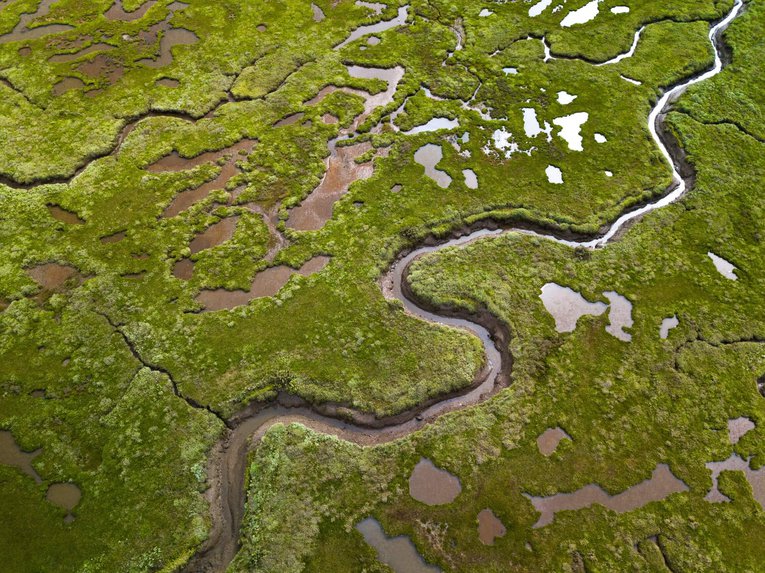
Credit: Shutterstock
Our new online portal helps chefs and businesses source sustainable seafood
We launched a brand-new digital platform to help businesses source more sustainable seafood.
The Good Fish Guide for Business is a new online portal that allows businesses, chefs, or anyone working in the seafood supply chain, to find out which fish or shellfish are the most environmentally responsible choice.
Discover more about how we’re working with businesses to make sure that they use sustainable seafood here.
A new era of ocean guardians
We announced our commitment to supporting and inspiring our next generation so that they can take action for the ocean, and the future of our planet.

Credit: Sue Ranger
December
Our annual conference
Our annual conference is always a fun event, not least for our inspirational guest speakers. This year they included Dragon's Den star Deborah Meaden and wildlife cameraman Doug Allan, who are both ocean ambassadors.
It's also when we announce the winners of our Marine Conservation Society awards for people who have done something amazing for the ocean. From freezing open water swims and sponsored haircuts, we're immensely proud of all our nominees, whose passion and optimism are really making waves within their communities.
Meet this year's winners and watch our rewilding conference sessions.

Credit: Hans-Jurgen Mager / Unsplash
The year ahead
It's not possible to mention all of our work, but there are so many other brilliant projects going on behind the scenes. As we head into the new year, we'll be working with renewed energy to push forward on all these important issues – and more!
Thank you to all our supporters
We couldn't have done any of this without your support, and with your continued backing we're looking forward to creating even more impact for our ocean in 2022!


